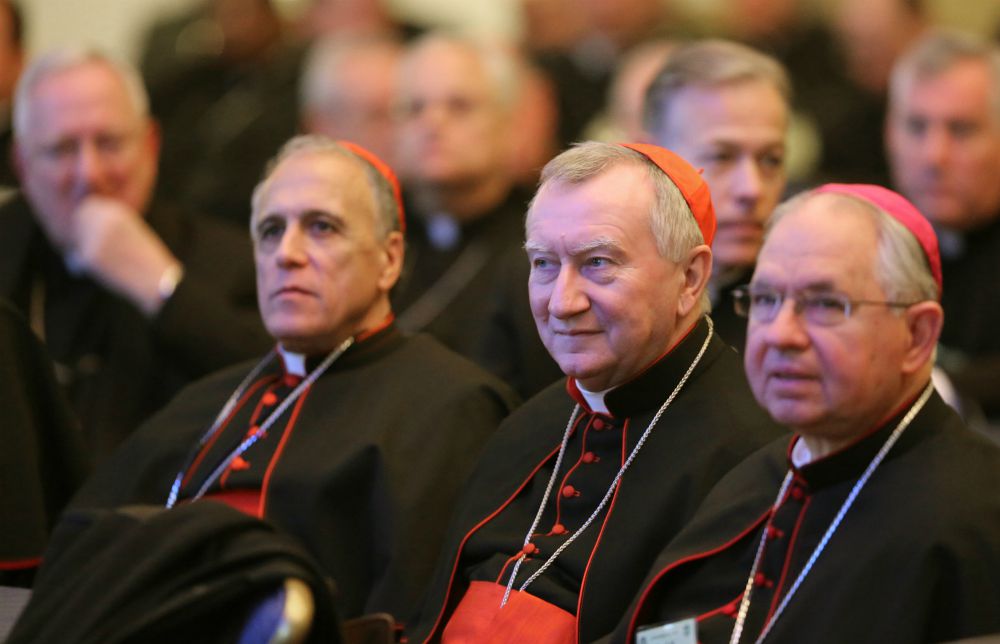
Cardinal Daniel DiNardo of Galveston-Houston, president of the U.S. Conference of Catholic Bishops, Cardinal Pietro Parolin, Vatican secretary of state, and Archbishop Jose H. Gomez of Los Angeles, USCCB vice president, listen during a Nov. 12 presentation in Baltimore on the centenary of the USCCB. (CNS / Bob Roller)
How open is the church to dissent and criticism, and how open should it be? Dissent in the church is as old as the argument between St. Peter and St. Paul described by Paul himself in Galatians. Another account is also given in the Acts of the Apostles.
Pope Francis himself has encouraged open debate. In doing so he has challenged decades of resistance to any attempt to disagree with anything coming out of the Vatican.
Conservatives who defended the pope's authority and condemned anyone who questioned Pope John Paul II or Pope Benedict XVI, are now freely trashing everything they don't like about the Francis message.
So, what is appropriate debate and dialogue in the church, and when does it cross the line? Let's start with Paul. We see that despite their fierce arguments, Peter and Paul remained in koinonia, or unity in their faith and teaching. Despite their very real differences, Paul is able to say that "James and Cephas and John, who were considered the pillars, gave to me and to Barnabas the right hand of fellowship" (Galatians 2:9).
In the New Testament, the Johannine community differences finally did break down near the end of the first century. The koinonia was broken and instead of charity, they no longer even considered the other to be Christian. They were the antichrist. See especially the second epistle of John.
Still, other than the eastern churches that separated after 1,000 years of unity, it wasn't until the reformation that Christianity began to splinter. The differences within the church and among nations became so strong that unity became impossible. Could we be seeing the beginning of another such time?
The cited NCR article on the tension within the Catholic bishops' association suggests the deep divisions as well as the strong desire for unity within today's church. Capuchin Fr. Thomas Weinandy, the head of the U.S. bishops' doctrine committee, sent a letter to Pope Francis, accusing him of promoting disunity and confusion. He was forced to resign. The president of the U.S. bishops' conference, Cardinal Daniel DiNardo of Galveston-Houston, had to assert that the bishops are "in strong unity with and loyalty to the Holy Father."
Advertisement
DiNardo went on to comment about the nature of dialogue and dissent within the church. He notes that debates on important topics have often been good. While he recognizes the need for humble and honest discussions around doctrinal issues, he makes clear how he feels about the nature of these discussions. DiNardo states, "It should be presumed that every good Christian ought to be more eager to put a good interpretation on a neighbor's statement than to condemn it. This presupposition should be afforded all the more to the teaching of our Holy Father."
If you examine the plethora of articles to be found on the internet criticizing this pope from every quarter, you wonder what terrible things Pope Francis has done. As near as I can tell, his crime is exhorting clergy and faithful to live the Gospel of Jesus Christ. My sense is the "fraternal" correction we are seeing is not a good faith exercise to broach a thoughtful discussion of the issues. Rather, it appears many traditionalists feel threatened by the words of this pontiff and are lashing out and even conspiring to ensure that no changes are permitted in the church.
Francis has barely touched on doctrinal issues. It is only a distorted interpretation of his words that could see him as questioning Catholic teaching. As DiNardo says, we should not be putting the worst possible interpretation on everything Francis says.
I do think Francis would like to consider a few operational changes to the church — for example, exploring who can receive Communion and under what circumstances. That is certainly a legitimate topic for discussion, but instead we are getting over-the-top accusations of abandoning Catholic teaching on marriage. We can have differences of opinion as to who should be allowed to receive Communion, but it should not be falsely made into a doctrinal issue. My own opinion is that Communion should not be made into a reward for good behavior. It is rather nourishment to help all of us be better Christians.
I also think Francis would be willing and would perhaps like to experiment with regional efforts at permitting married priests. No one in the church believes this is a doctrinal issue, but resistance to such actions suggests something more than ordinary disagreement is going on.
Pope Francis was criticized when he washed the feet of women and non-Catholics on Holy Thursday. Such resistance indicated that some simply want to live in an earlier era and will oppose even the most innocuous efforts to bring the Gospel to the people. Is the job of the church to preserve a former way of doing things, or to find a way to bring the Gospel of Jesus to the people in a way they can understand and respond in a positive manner?
If conservatives and traditionalists continue to insist that the church cannot change or be updated, I fear there may be no solution to our present situation other than a schism. Considering some of the hate and vitriol we have been seeing, and the lack of charity on both sides, schism may be a better solution than the current enmity.





